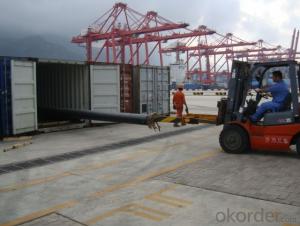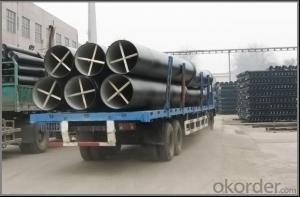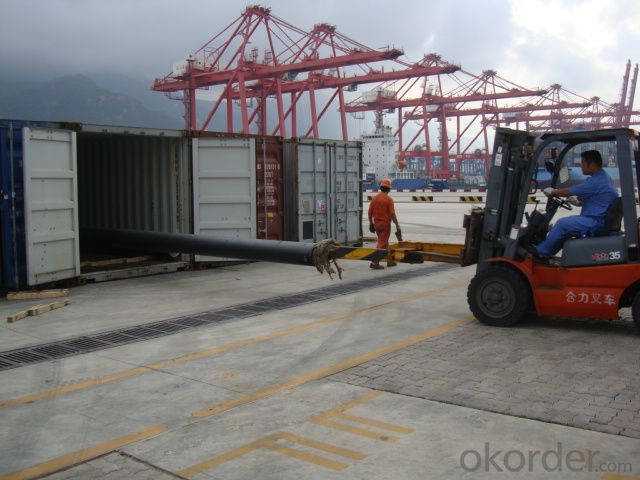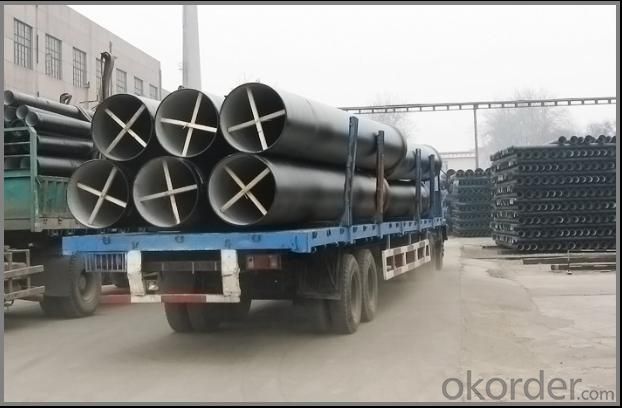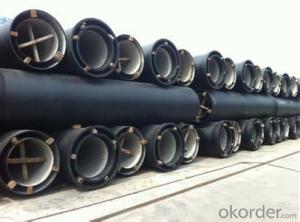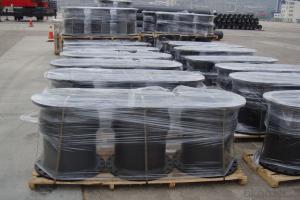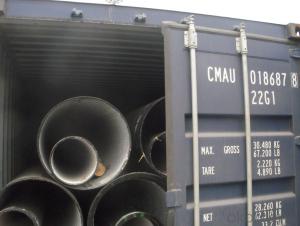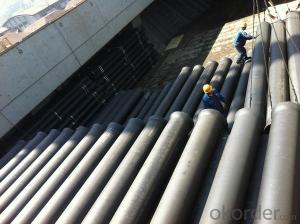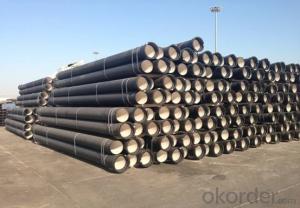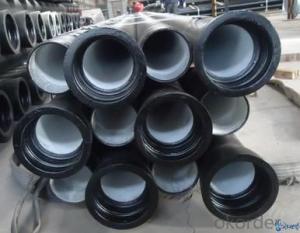DUCTILE IRON PIPE C Class DN 400
- Loading Port:
- Tianjin
- Payment Terms:
- TT OR LC
- Min Order Qty:
- -
- Supply Capability:
- 30000Tons m/month
OKorder Service Pledge
OKorder Financial Service
You Might Also Like
CNBM ductile iron pipe ranges from DN80-DN1600mm (T-Type, Class K9), effective length 6m, comply with ISO2531 Standard
Company Profile
CNBM International Corporation is the leading production base and renowned supplier of Ductile Iron Water Pipe systems of both potable and waste water in China. We are constantly looking to develop high quality products to ensure the longest service life and wonderful performance.
CNBM Pipelines regard quality as the essential factor leading to successful business. Every pipe is tested in accordance with BS EN545 (water application) or BS EN598 (sewer application). CNBM Pipelines products comply with and are tested according to the relevant European and International Standards. Our pipes are manufactured under the quality management system BS EN ISO 9001. After years of efforts, CNBM Pipelines has built up great reputation in terms of quality and service among customers worldwide
Product Introduction
CNBM ductile iron pipe ranges from DN80-DN1600mm (Tyton, T-Type, Class K7/K8/K9), effective length: 6m, complying with BS EN545/EN598/ISO2531/BS4772.
Specification& Payment terms
Internal lining: Pipes shall have an internal cement mortar lining in acc with ISO4179.
External coating: Pipes shall be externally coated with metallic zinc spray plus a further layer of resin painting to ISO8179.
Gasket: 100% SBR/NBR/EPDM gasket in accordance with ISO4633.
Packing: Pipes from DN100 to DN300 be bundled with steel belts, the others are in bulk.
Payment term: By 30% T/T advance payment + 70% Irrevocable L/C at sight.
Packing: In bulk vessel or in container.
- Q: Are ductile iron pipes suitable for use in cold climates?
- Yes, ductile iron pipes are suitable for use in cold climates. Ductile iron possesses excellent resistance to low temperatures, making it highly suitable for use in freezing conditions. Its high durability and strength enable it to withstand extreme temperatures and harsh weather conditions commonly found in cold climates.
- Q: How does ductile iron pipe handle soil movements and settlements?
- Ductile iron pipe has gained a reputation for effectively managing soil movements and settlements. Its ability to accommodate ground shifts and settling without compromising its structural integrity is attributed to its flexibility and durability. A notable characteristic of ductile iron pipe lies in its inherent strength and resilience. It can endure external pressures and stress caused by soil movements, including lateral forces and ground settlement. This is due to its high tensile strength, which enables it to resist deformation and maintain its shape even under substantial loads. Furthermore, the flexibility of ductile iron pipe plays a crucial role in its capacity to handle soil movements. The pipe's natural flexibility allows it to absorb the impacts of ground shifts and movements without fracturing or breaking. It can bend and adjust to changes in the surrounding soil, minimizing the risk of pipe failure or leakage. Additionally, the joint design of ductile iron pipe contributes to its effectiveness in managing soil movements and settlements. The installation employs a push-on joint system that permits some movement and settlement without compromising the overall integrity of the pipeline. The joints can absorb and distribute stress and movement, minimizing the risk of pipe failure. In conclusion, ductile iron pipe excels in managing soil movements and settlements. Its strength, flexibility, and joint design enable it to withstand external pressures resulting from ground shifts, settling, and other soil movements. As a result, ductile iron pipe is a reliable choice for a range of applications where soil movement is a concern.
- Q: What is the acceptance of cast iron pipe material?
- Specific acceptance, first of all in line with national standards, followed by the provisions of the contract, and then the project requirements. General contract and drawings will have the requirements and standards of pipe. I hope I can help you.
- Q: Can ductile iron pipes be used in sewage treatment plants?
- Yes, ductile iron pipes can be used in sewage treatment plants. Ductile iron is commonly used in sewage systems due to its durability, corrosion resistance, and ability to withstand high pressure and load-bearing requirements. It is an ideal material choice for transporting sewage and wastewater within treatment plants.
- Q: Are ductile iron pipes suitable for bridge piers or abutments?
- Ductile iron pipes are indeed appropriate for bridge piers or abutments. This material, known for its strength and durability, is extensively utilized in diverse infrastructure undertakings, such as bridges. It possesses exceptional mechanical characteristics, including remarkable tensile strength and impact resistance, rendering it capable of withstanding substantial loads and external forces. Moreover, ductile iron pipes exhibit high resistance to corrosion and enjoy a lengthy service life, which is crucial for structures like bridge piers or abutments that face harsh environmental conditions. The adaptability and dependability of ductile iron pipes deem them a fitting choice for supporting and fortifying bridge structures, ensuring their safety and longevity.
- Q: How many meters does the cast iron water supply pipe dn150,1 tons?
- Reciprocating centrifuge hydraulic device, the pressure was 9.65 x 105Pa. the speed through the overflow valve, cable and cooling water hose is generally fixed on the centrifuge and the machine next to the post, the other end is connected to the shell, random moving together. The production standard of centrifuges is usually fixed. If we want to produce several specifications of pipes on a centrifuge, we need to replace the fan-shaped packages, the hot metal flow plants and the support roller racks.
- Q: Can ductile iron pipes be used for stormwater management?
- Yes, ductile iron pipes can be used for stormwater management. Ductile iron is a strong and durable material that is resistant to corrosion and can withstand the high flow rates and pressures typically associated with stormwater management systems. These pipes have been widely used for various applications, including stormwater drainage and sewage systems. Their ability to handle heavy loads and withstand environmental factors makes them a suitable choice for stormwater management, ensuring efficient water flow and preventing flooding in urban areas. Moreover, ductile iron pipes have a long lifespan, reducing the need for frequent maintenance and replacement, making them a cost-effective choice for stormwater management infrastructure.
- Q: What are the interface forms of ductile iron pipes? The best drawings are available. Thank you
- T interface type sealing ring is a self sealing rubber ring, when the pipe internal pressure increases, the contact pressure between the seal and the pipe increases, T interface can not only allow the deflection angle of the axial displacement, and convenient for installation. When the T type interface is installed, the sealing of the rubber ring can be ensured as long as the socket is simply loaded into the socket and the rubber ring is pressed tightly. This kind of interface has the advantages of reliable sealing, good seismic resistance and corrosion resistance, and it is a better interface.
- Q: Ductile iron pipe joint leakage
- After cleaning the pipe mouth, the cf-2000 high efficiency composite waterproof agent is used to seal it, and it will not leak.
- Q: What is the DN400 installation charge for ductile iron pipes?
- Labor cost: refers to the total amount of wages according to the provisions of the payment to the construction and installation works in the production of workers and ancillary production units of workers costs.
Send your message to us
DUCTILE IRON PIPE C Class DN 400
- Loading Port:
- Tianjin
- Payment Terms:
- TT OR LC
- Min Order Qty:
- -
- Supply Capability:
- 30000Tons m/month
OKorder Service Pledge
OKorder Financial Service
Similar products
Hot products
Hot Searches
Related keywords
